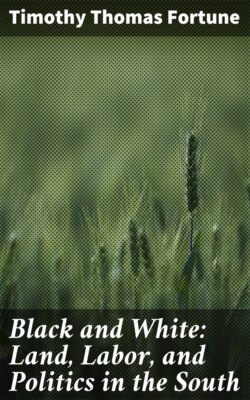Читать книгу Black and White: Land, Labor, and Politics in the South - Timothy Thomas Fortune - Страница 12
На сайте Литреса книга снята с продажи.
FOOTNOTES:
ОглавлениеTable of Contents
[3] Neither slavery nor involuntary servitude, except as a punishment for crime, whereof the party shall have been duly convicted, shall exist within the United States, or any place subject to their jurisdiction.—Art. XIII. Sec. 1 of the Constitution.
[4] All persons born or naturalized in the United States, and subject to the jurisdiction thereof, are citizens of the United States and of the State in which they reside. No State shall make or enforce any law which shall abridge the privileges or immunities of citizens of the United States; nor shall any State deprive any person of life, liberty, or property without due process of law, nor deny to any person within its jurisdiction the equal protection of the laws—XIVth Amendment, Section 1.
[5] The right of citizens of the United States to vote shall not be denied or abridged by the United States, or by any State, on account of race, color, or previous condition of servitude.—XVth Amendment, Sec. 1.
[6] While I write these lines, the daily newspapers furnish the following paragraph. It is but one of the waifs that are to be found in the newspapers day by day. There is always some circumstance which justifies the murder and exculpates the murderer. The black always deserves his fate. I give the paragraph:
"Spear, Mitchell Co., N.C., March 19, 1884.—Col. J.M. English, a farmer and prominent citizen living at Plumtree, Mitchell County, N.C., shot and killed a mulatto named Jack Mathis at that place Saturday, March 1. There had been difficulty between them for several months.
"Mathis last summer worked in one of Col. English's mica mines. Evidence pointed to him being implicated in the systematic stealing of mica from the mine. Still it was not direct enough to convict him, but he was discharged by English. Mathis was also a tenant of one of English's houses and lots. In resentment he damaged the property by destroying fences, tearing off weather boards from the house, and injuring the fruit trees. For this Col. English prosecuted the negro, and on Feb. 9, before a local Justice, ex-Sheriff Wiseman, he got a judgment for $100. On the date stated, during a casual meeting, hot words grew into an altercation, and Col. English shot the negro. Mathis was a powerful man. English is a cripple, being lame in a leg from a wound received in the Mexican war.
"A trial was had before a preliminary court recently, Col. S.C. Vance appearing for Col. English. After a hearing of all the testimony the court reached a decision of justifiable homicide and English was released. The locality of the shooting is in the mountains of western North Carolina, and not far from the Flat Rock mica mine, the scene of the brutal midnight murder, Feb. 17, of Burleson, Miller, and Horton by Rae and Anderson, two revenue officers, who took this means to gain possession of the mica mine."
My knowledge of such affairs in the South is, that the black and the white have an altercation over some trivial thing, and the white to end the argument shoots the black man down. The negro is always a "powerful fellow" and the white man a "weak sickly man." The law and public opinion always side with the white man.
